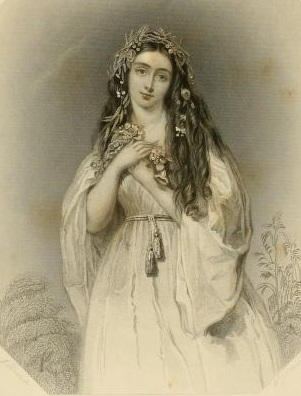| directory |
| home | contact |
|
|||||||||||||||
| search | |||||||||||||||
The Shakespeare Sisterhood: OpheliaWe shrink from the task of dissecting the sensitive beauties of Ophelia's character, as we should from the necessity of tearing apart the blushing bosom of a rose to count its stamens, or of impaling a butterfly to ascertain its "family;" we prefer to have a not too sharply defined idea of this most delicate embodiment, to accept her as a beautiful article of faith, which it is neither necessary nor desirable to thoroughly understand.Ophelia is a more ideal, a more purely imaginative creation than Juliet or Desdemona; with the story of her youth, her tender beauty, her hapless love which leads to insanity and a tragic death, we sympathize less painfully than with the sorrows of those more vividly depicted heroines; indeed the very tints, pale yet enduring, in which her shadowy outline is traced, constitute a touching appeal to the hand of a would-be "restorer;" one should be content to spare her retiring delicacy any sentiment of pity more impertinently familiar than a tender pathos. The childlike nature of Ophelia, innocent of even the knowledge of evil, impresses us from the first with the conviction that she is foredoomed a victim -- a beautiful but inevitable sacrifice to relentless Destiny. Amid the bad passions, the subtle plottings, the tasteless criminality of the Danish court, she alights, a dove of gentleness and love, a very snowflake of virginity; she must die, or suffer contamination -- and she fulfils the only alternative possible to her. In contradistinction to our almost resentful contemplation of the sad fates which befall Juliet and Desdemona, we are perfectly reconciled to the melancholy consummation of Ophelia's woes. We feel that, to her, reaction from so blasting a shock would be impossible -- that after the first rude jarring of her delicately attuned sensibilities, which leaves them shattered and discordant, their sweet harmony can never again be restored. It is pitiful to note how this young creature, whose love is so exquisitely sensitive that she scarce confesses it to herself, is tortured by the tactless catechizing of her hot-headed brother, and her garrulous, worldly-wise old father -- of all men the two least fitted to probe the tender depths of her heart, and having found its secret, to advise her of her danger without corrupting her angelic purity. The very faith she reposes in their words, accepting them as oracles, however her instinctive belief in her lover's honor may cry out against the outrage, renders their lessons the more cruel; she has no wit with which to confound them, no words to uphold her in ever so gentle an argument; she has no choice but to believe and obey -- a mere puppet in their hands. At first, allowed the full bent of her inclination in giving audience "most free and bounteous" unto the lord Hamlet; then forbidden to see or speak with him; and still again, given up to him, as it were, as an unfeeling test of his alleged madness for her love: when we consider the alternations of hope, fear, and final despair which must have attended each experiment, we cannot be surprised that they result in a total overthrow of her "most ingenious sense," "dividing her from her fair judgment." How to cite this article:___________ Related Articles
|

|
©1999-2021 Shakespeare Online. All Rights Reserved.